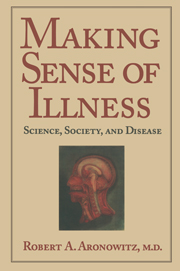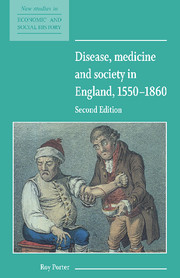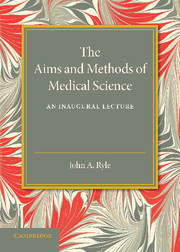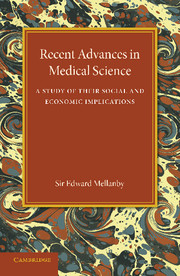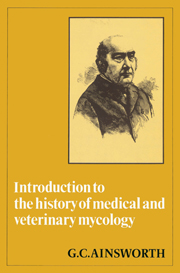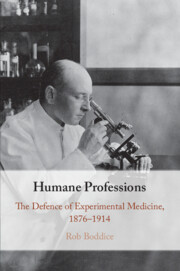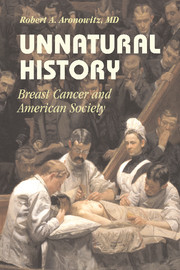Making Sense of Illness
Science, Society and Disease
Part of Cambridge Studies in the History of Medicine
- Author: Robert A. Aronowitz, University of Medicine and Dentistry, New Jersey
- Date Published: May 1999
- availability: Available
- format: Paperback
- isbn: 9780521558259
Paperback
Other available formats:
Hardback
Looking for an examination copy?
This title is not currently available for examination. However, if you are interested in the title for your course we can consider offering an examination copy. To register your interest please contact [email protected] providing details of the course you are teaching.
-
Making Sense of Illness is a fascinating investigation into the social and clinical factors that determine what constitutes a "legitimate" illness in the twentieth century. By examining six case studies of diseases that have emerged within the past fifty years--from what we now consider to be "straightforward" diseases such as coronary heart disease, to the currently widely-debated Chronic Fatigue Syndrome--Aronowitz examines the historical and cultural factors that influence how doctors think about illness; how illnesses are recognized, named, classified, and finally, what they "mean" in an individual and social context. The choices that are available to the investigators, clinicians, patients and the processes by which change occurs are factors that all play a great role in "legitimizing" an illness, and these are the roles that are seldom examined. By juxtaposing the histories of each disease, Aronowitz shows how cultural and historical precedents have determined research programs, public health activities, clinical decisions, and even the patient's experience of illness. This is a must-read for anyone interested in public health and the history of medicine in the United States.
Read more- Connection between how diseases are discovered, named, then researched and debated for legitimacy, responsibility and significance
- Extension of the social construction of disease framework to supposedly straightforward diseases such as Lyme disease and coronary heart disease
- Aronowitz is both a medical doctor and historian
Reviews & endorsements
"Making Sense of Illness succeeds as both a medical monograph and a book for the lay reader because it speaks to such deep matters of health and health care delivery, and accomplishes its task in relatively jargon-free language. This is a book for the thinking reader." The Washington Post
See more reviews"This book will stimulate responses from both the ontologic and holistic camps...It should be especially appreciated by the new breed of academics incessantly involved in designing and redesigning the medical school curriculum." The New England Journal of Medicine
"The author of this very sensible book is no ideologue; he makes us think hard about interactions among social and biological determinants of disease meaning....Making Sense of Illness succeeds as both a medical monograph and a book for the lay reader because it speaks to such deep matters of health and health care delivery, and accomplishes its task in relatively jargon-free language. This is a book for the thinking reader." Harold J. Morowitz, The Washington Post
"Robert A. Aronowitz has written a challenging and most interesting short book perhaps best characterized as medical historicosociologic in scope...I hope that Making Sense of Illness will be widely read and discussed within our profession." Joseph S. Alpert, MD, JAMA
"...a doctor's effort to do justice...bringing us to our (clinical senses) so that we can appreciate the limits as well as the extent of our new knowledge." Robert Coles, The Lancet
"The great virtue of this book is the author's esential even handedness. He is an astute clinician...alert to the way new knowledge can becloud as well as inform..." Robert Coloe, The Lancet
"The author wants us to examine closely the way our thinking about diseases in the abstract effects our relationship with our patients...those broader social and cultural matters as they bear down on the daily encounters that take place in medical offices across the world, and especially among the priveledged, health-conscious bourgeoisie of the western world." Robert Coloe, The Lancet
"...in this century, we have acquired an astonishing body of knowledge about the mechanisms of various diseases, and this book in no way underestimates or undervalues that knowledge." Robert Coles, The Lancet
"...an insightful book focused on 20th-century medical developments and based on his own clinical experiences with chronic disease. ...should be read by everybody who cares for the future of medicine." Inquirer
"His argmumentation is lucid, temperate, and scholarly. His intention is to open his readers' eyes to the historical contingencies and unexamined assumptions that underpin medical knowledge. His case studies wil be substantively interesting to psychiatric audiences, but it would be a mistake to ignore the book's larger imlications for psychiatry. Aronowitz's splendid book points us in this direction." Allan Young, Ph.D., The Journal of Nervous and Mental Disease
Customer reviews
Not yet reviewed
Be the first to review
Review was not posted due to profanity
×Product details
- Date Published: May 1999
- format: Paperback
- isbn: 9780521558259
- length: 286 pages
- dimensions: 229 x 152 x 20 mm
- weight: 0.4kg
- availability: Available
Table of Contents
1. Introduction
2. The rise and fall of the psychosomatic hypothesis in ulcerative colitis
3. From myalgic encephalitis to yuppie flu: a history of chronic fatigue syndrome
4. Lyme disease: the social construction of a new disease and its social consequences
5. From the patient's angina pectoris to the cardiologist's coronary heart disease
6. The social construction of coronary heart disease risk factors
7. The rise and fall of the type A hypothesis
8. Conclusion.
Sorry, this resource is locked
Please register or sign in to request access. If you are having problems accessing these resources please email [email protected]
Register Sign in» Proceed
You are now leaving the Cambridge University Press website. Your eBook purchase and download will be completed by our partner www.ebooks.com. Please see the permission section of the www.ebooks.com catalogue page for details of the print & copy limits on our eBooks.
Continue ×Are you sure you want to delete your account?
This cannot be undone.
Thank you for your feedback which will help us improve our service.
If you requested a response, we will make sure to get back to you shortly.
×
